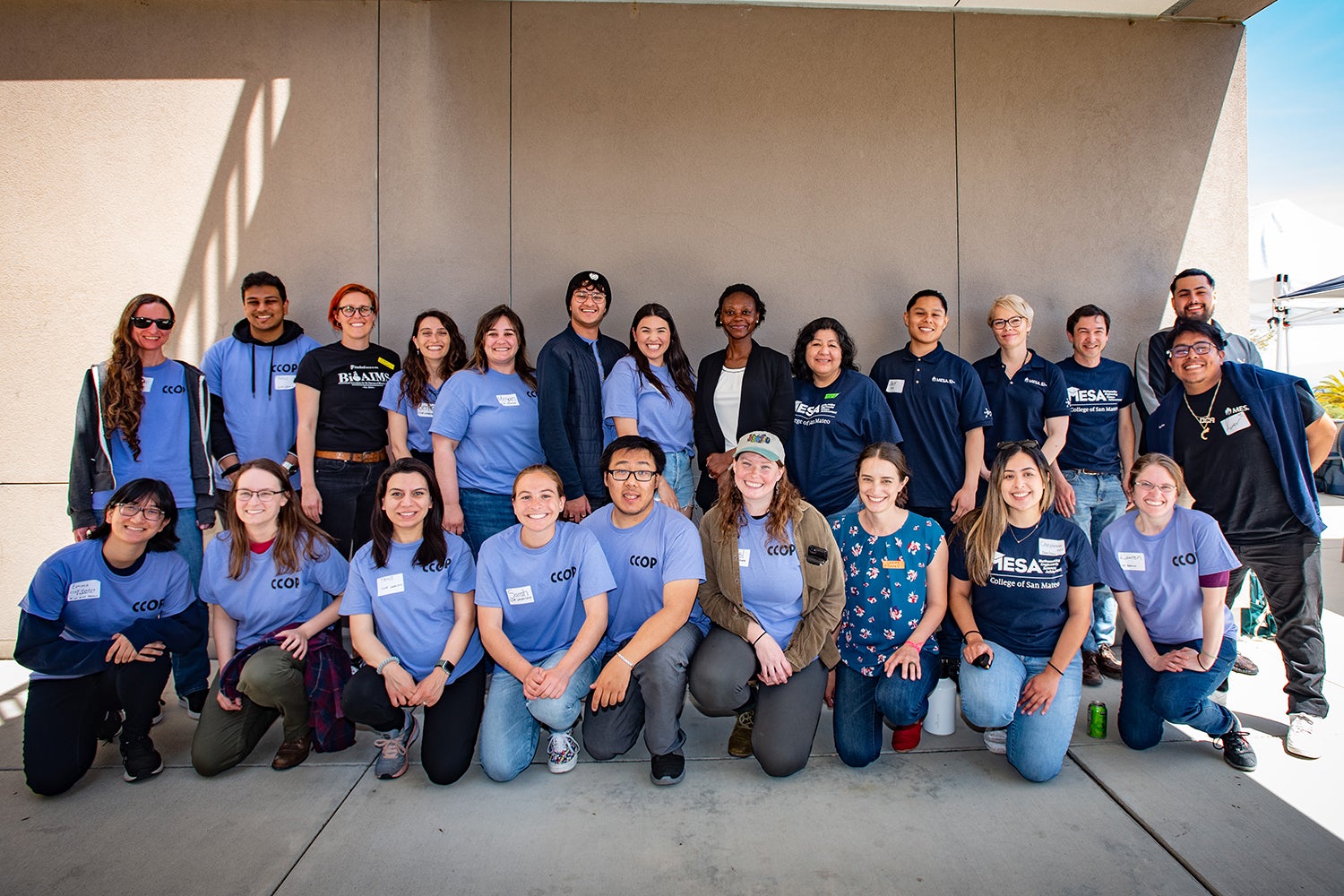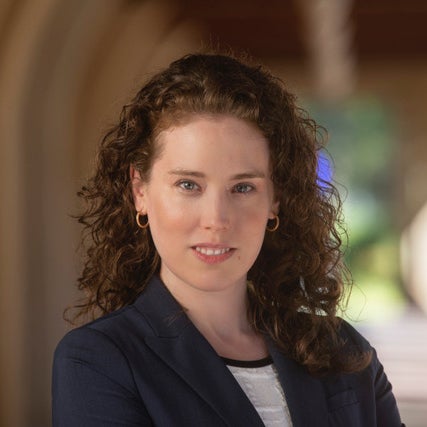This year, Stanford honors professor of health policy Sherri Rose, Graduate School of Education doctoral student Darion Wallace, and the Community College Outreach Program with the 2023 President’s Awards for Excellence Through Diversity.
The awards were established in 2009 to honor people and programs that have made exceptional contributions to enhancing and supporting diversity within the university community. Three awards may be conferred annually: one to a campus unit, one to a faculty or staff member, and one to a student or student organization.
The awards are intended to recognize that a diverse campus community enhances the university’s institutional excellence by broadening and strengthening Stanford’s mission of teaching, learning, and scholarship. Stanford students, faculty, and staff submit award nominations to the Office of Faculty Development, Diversity and Engagement.
President Marc Tessier-Lavigne presented the awards to the recipients this week, with Megan J. Agajanian receiving the award on behalf of the Community College Outreach Program as its director.
Sherri Rose
The work and career of Rose, professor of health policy, reflect her deep commitment to diversity, equity, and inclusion that has enhanced the Stanford community.
Rose is a founding co-chair of the Department of Health Policy’s Justice, Equity, Diversity, and Inclusion (JEDI) Committee and a founding organizer of the Stanford Health Policy Health Equity Lecture Series, and was previously a diversity liaison for the School of Medicine.
A nominator wrote that “when difficult decisions need to be made, when time is short, when multiple priorities must be weighed, it is often too easy to fall into time-worn patterns and defaults. Dr. Rose helps all of us to be better than that, by diplomatically but forcefully ensuring that diversity considerations receive their appropriate weight.”
In 2020, Rose became a founding co-director of the Stanford Population Health Summer Research Program – a 7-week training and research experience for community college and undergraduate students from underrepresented and historically excluded groups in the health sciences.
“Growing up low-income and existing as a woman in academic spaces, I’ve experienced certain types of exclusion and marginalization. I also have many forms of privilege,” Rose said. “This work is a moral imperative – it has never been a question to me about whether I would invest my time toward making our academic environments better aligned with principles of justice.”
Rose created the popular course Decoding Academia: Power, Hierarchies, and Transforming Institutions, which gives Stanford graduate students tools to increase their success. As a collaborator and mentor, Rose has supervised students and trainees working on gender minority health, risk adjustment, and algorithmic fairness in health care payment models, housing issues, and COVID-19 health disparities. She has also served as a faculty resource advisor for the Diversifying Academia, Recruiting Excellence doctoral fellowship program.
Rose has brought diversity-enhancing research projects to the university, and she recognizes how medical and health policy decisions can marginalize and exclude minoritized groups. Her “work has exposed these problems, quantified their impact, and proposed reforms for remediating them,” her nominators wrote.
“Elite institutions contribute to upholding an inequitable status quo,” Rose said. “Justice, equity, diversity, and inclusion initiatives that focus on transforming historically exclusionary spaces are essential to the university’s mission.”
Darion Wallace
Wallace is a doctoral student in race, inequality, and language in education at the Graduate School of Education and Knight-Hennessy Scholar whose research, leadership, and community initiatives have provided instrumental support to the Black community and others at Stanford.
“Black students at Stanford and across the diaspora consistently grapple with the fact that freedom remains an unachieved project,” Wallace said. “Creating and participating in spaces dedicated to advancing and cultivating Black joy, culture, knowledge, and activism is one of several enunciations of justice and equity on our terms.
“Organizing Black political, cultural, and intellectual life at Stanford is my good faith attempt at mitigating against the harsh pressures of antiblackness in the world that converge upon campus life. Ultimately, this work is a part of a longer history and continuum of Black liberation struggles at Stanford and beyond.”
Wallace’s research examines the intertwined geography of anti-slavery abolition and early Black education movements in 19th-century California, significantly contributing to understanding of the barriers faced by Black students in the American K-12 education system, a nominator wrote.
As president of the Stanford Black Graduate Student Association (BGSA), Wallace has led programs focused on academic retention, political awareness, and professional development to improve the experience of Black students.
Wallace also provided key support as a teaching assistant in the Ernest Houston Johnson Scholars Program, which assists Black frosh in their transition to Stanford. During the capstone course in African & African American Studies, Wallace supported students in their honors theses and capstone projects.
“Darion’s dedication to promoting diversity, equity, and inclusion within the Stanford community has had an extraordinary impact on the lives of countless students, faculty, and staff members,” a nominator wrote.
He is also a graduate fellow in African & African American Studies, and organized the event “Emerging Directions in Black Studies: A Fireside Chat with Doctoral Students.” Additionally, Wallace is a graduate student representative on the Black Community Council, creator of the Stanford Black Men’s Guild, a Black Community Services Center graduate scholar in residence, a graduate resident assistant, and leader within Alpha Phi Alpha.
Wallace’s efforts at Stanford help enhance the university’s institutional excellence and support its values.
“As a global leader in transformative knowledge production with a dedication to improving civic engagement, this work pushes Stanford toward achieving its expressed commitment to advancing racial justice,” Wallace said. “While university life is a microcosm of societal practices, beliefs, and ethics, this work allows our campus community to experiment with new and old articulations of justice, community, and equity at the level of the individual and the collective.
“Furthermore, it serves as inspiration for structural changes throughout the university – such as increased student of color representation, more diverse faculty, expanded mental health resources – to hopefully one day reduce the necessity for diversity work in whole.”
Community College Outreach Program (CCOP)

The Community College Outreach Program leadership team and College of San Mateo MESA Program team at CCOP’s inaugural Day of Science Symposium held on the campus of College of San Mateo. (Image credit: College of San Mateo)
The CCOP, established by the Department of Developmental Biology, offers scientific mentorship and provides a first-rate research opportunity to underrepresented and underserved community college students, shifting perspectives on who can be a scientist, said CCOP Director Megan Agajanian.
It was founded in 2020 as a grassroots effort by developmental biology PhD students Teni Anbarchian and Wendy Wenderski, who both attended community college and wanted to support others.
“Our leadership team of Stanford trainees put in a tremendous amount of effort. We are grateful to those who have helped CCOP grow,” Agajanian said. “It is wonderful to see our work impact young scientists and be recognized by the faculty that nominated us, the selection committee, and Stanford leadership.
“We hope this recognition opens doors for similar outreach work, by spotlighting the need for and impact of our program in our scientific community. We hope to inspire members of the Stanford community to join us in our mission of making academia a more diverse, equitable, and inclusive space.”
The CCOP has directly impacted more than 150 community college students in San Mateo and Santa Clara counties and facilitated around 5,000 mentorship or service hours to community college students in STEM fields. One mentee thanked the CCOP “for giving me a chance to succeed and find my place in science.”
The CCOP has “enriched and diversified our Stanford community, strengthened our links to nearby community colleges, and most importantly, provided pathways for community college interns to learn about, and remain in, STEM careers,” said one nominator.
The program currently partners with the College of San Mateo, Cañada College, and Santa Clara’s Mission College to share opportunities, understand students’ needs, collaboratively build programs, and provide STEM research training.
In the program, community college students participate in a paid 10-week research internship at Stanford each quarter. The students are paired with a Stanford graduate student or postdoc, and a faculty advisor; read scientific literature; perform lab experiments; and prepare presentations.
CCOP’s 6-week career development boot camp includes mentorship from Stanford scientists and weekly workshops on how to apply to internships and scholarships and to transfer to a four-year university.
Participant surveys indicate an increased interest in science, confidence in abilities, inclination to pursue further education or careers in STEM, sense of belonging in the field, and likelihood of continuing research.
“We have seen incredible outcomes from mentees, and from Stanford trainees and labs that have seen immediate improvement on thoughts and actions around diversity, equity, and inclusion,” Agajanian said. “Our hope for the future is that CCOP becomes established within Stanford’s infrastructure, and we welcome all collaborations across Stanford to expand the impact of CCOP.”

